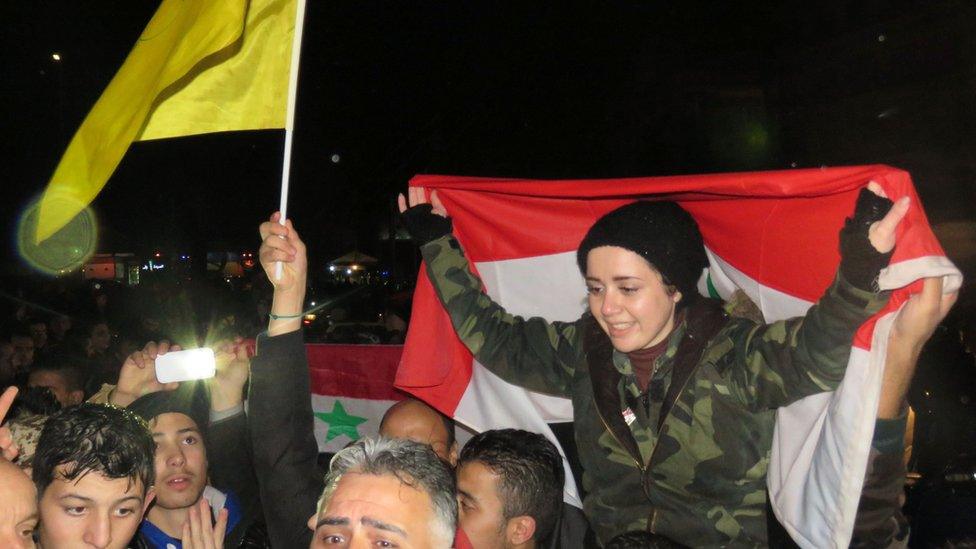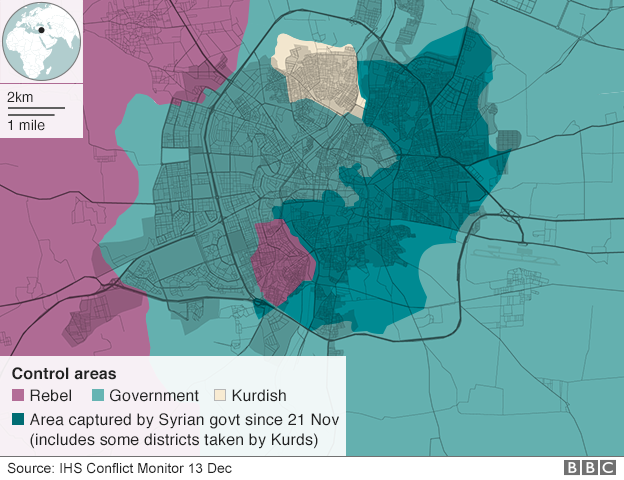Aleppo battle ends as Syria rebel deal reached
- Published
"Here comes the barrel bomb" - trapped resident Joud al-Khatib in Aleppo
Military action has ended in eastern Aleppo, Russia's ambassador to the UN, Vitaly Churkin, has said.
He said Syrian government troops had re-established control over the last areas of the city held by rebels.
He said an arrangement had been made for rebel fighters to leave. The rebels confirmed the deal, but said civilians would also be allowed to leave.
The latest developments could bring to an end more than four years of vicious fighting in which thousands have died.
Reporters on the ground said there had been no bombardments or fighting in recent hours.
The rebels had been squeezed into ever smaller areas of the city in recent months in a major government offensive backed by Russian air power.
Word of the deal came as the UN reported summary killings by pro-government forces.
It said it had reliable evidence that in four areas 82 civilians were killed, adding that many more may have died.
The UN and the US said the Syrian government and its allies Russia and Iran were accountable for any atrocities committed in the city.
Russia said the allegations were untrue.
As rebels are pushed out of eastern Aleppo, one resident explains why many civilians are unable to escape.
"According to the latest information that we received in the last hour, military actions in eastern Aleppo are over," Mr Churkin told an emergency session of the UN Security Council.
Earlier he had spoken of the deal allowing the rebels to leave, saying it would take place within hours.
"The civilians, they can stay, they can go to safe places, they can take advantage of the humanitarian arrangements that are on the ground. Nobody is going to harm the civilians," Mr Churkin said.
Rebel groups suggested that civilians would be included in the exodus.

Extraordinary turnaround: By BBC defence and diplomatic correspondent Jonathan Marcus

On Monday, Syrians in western Aleppo celebrated the prospect of an imminent victory in the east
The seizure of the eastern part of the city by government forces and the crushing of the rebel enclave there represents a major propaganda victory for the government of President Bashar al-Assad, which now controls virtually all of the major population centres of the country.
But Aleppo - the most populous city before the civil war and the country's financial centre - is the biggest prize.
Its capture represents a victory not just for Mr Assad but also for his Iranian and Russian backers.
Aleppo itself may not matter much on Moscow's strategic chess-board. But the defeat of the rebel opposition there underscores the extraordinary turn-around in President Assad's fortunes.
Before Russia intervened President Assad was on the ropes, his military power crumbling.
External actors have propped up his government in large part to secure their own strategic aspirations. And these aspirations will play an important part in deciding what comes next.

What is the situation in the rebel areas?
Before the end to hostilities was announced, the rebels had retreated into just a handful of neighbourhoods.
Aleppo MP Fares Shehabi denied government forces were committing atrocities
It is hard to know exactly how many people are in the besieged areas, although UN envoy Staffan de Mistura put the figure at about 50,000.
He said there were approximately 1,500 rebel fighters, about 30% of whom were from the jihadist group formerly known as the al-Nusra Front.
Other local sources say there could be as many as 100,000 people, many of them arriving from areas recently taken by the government.
"There will be a genocide" Aleppo resident tells BBC Newsnight
Ibrahim Abu-Laith, a spokesman for the White Helmets volunteer rescue group, said 90% of their equipment was out of operation and only one medical point was still working in the besieged areas. There was no first aid equipment left, he added.
He said volunteers were using their hands to pull people out of rubble, but some 70 people were stuck and could not be extracted.

Last messages from Aleppo
Activist Lina Shamy: "Humans all over the world, don't sleep! You can do something, protest now! Stop the genocide".
Bana Alabed, aged 7: "I am talking to the world now live from East #Aleppo. This is my last moment to either live or die."
White Helmets tweet: "All streets & destroyed buildings are full with dead bodies. It's hell."
Abdul Kafi Alhamado, teacher: "Some people are under the rubble, no-one can help them. They just leave them under the rubble until they die - these houses as their graves."

What has happened in districts seized by the government?
UN human rights spokesman Rupert Colville said that 82 civilians had reportedly been killed by pro-government forces, of whom 11 were women and 13 children, adding that the death toll could be much higher.
He said there were reports of numerous bodies in the streets, with residents unable to retrieve them for fear of being shot on sight.
The UN's humanitarian adviser on Syria, Jan Egeland, earlier spoke of "massacres of unarmed civilians, of young men, of women, children, health workers", saying a pro-government Iraqi Shia militia was responsible for the killings.
What does this mean for the civil war?
This is a huge blow to the armed opposition, and a major victory for the Russians, the Iranians, Lebanon's Hezbollah and some Iraqi Shia militias.
But the rebels still control quite large areas, as do the jihadists of so-called Islamic State. So in terms of Syria itself the war continues.
The BBC's Middle East editor Jeremy Bowen says it will be a different type of war - less rebels trying to hold territory and create their own entity, more hit-and-run and insurgency.
What is the international community saying?
At the UN Security Council meeting, US ambassador Samantha Power said the Syrian government and Russia and Iran bore responsibility for killings of civilians.

For the UK, Matthew Rycroft said the UN had failed in its mission to resolve the crisis, and the reports of atrocities "evoked the darkest days of the history of the United Nations".
Mr Churkin denied humanitarian abuses were taking place. Earlier Russia said atrocities were being carried out by "terrorist groups", referring to rebels.
How did Aleppo reach this point?
For much of the past four years, Aleppo has been divided roughly in two, with the government controlling the western half and rebels the east.
Syrian troops finally broke the deadlock with the help of Iranian-backed militias and Russian air strikes, reinstating a siege on the east in early September and launching an all-out assault weeks later.